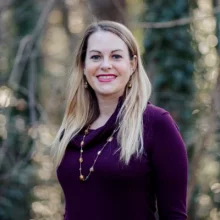
As we approach the tenth anniversary of the North Carolina Early Childhood Foundation (NCECF) working across the state of North Carolina, on behalf of young children, their families, and their caregivers and educators, we are filled with the kind of excitement that children feel when they are reaching their first double digit birthday.
NCECF’s tenth birthday milestone gave us the opportunity to look back at the story of how our organization focused on the intersection and continuum of early childhood education (ECE) came to be, but also what we’ve accomplished over the years. That reflection, as a trip down memory lane, included interviews with our founding executive director, Susan Gale Perry; co-founder, Tracy Zimmerman, who later became executive director; and, of course, Muffy Grant, our current executive director.
At the time of its inception, our co-founders, along with NCECF Community Engagement Leader Lisa Finaldi, were all working together at Smart Start & the North Carolina Partnership for Children (NCPC). Much like where we are now in 2023, North Carolina was seeing an increase in need for addressing early childhood care and education.
“The question became, ‘how do we ensure we have the ability to change or influence public policy around the early childhood landscape?’” Lisa said.
Here’s what our organizational leaders had to say about that as we look back on the origin.
- Lindsay: What brought on the inspiration to explore creating a new organization?
Susan: A group of folks working with Smart Start staff and board recognized we were in a political time and juncture to have a nonpartisan organization to advocate and build the connection from early birth [through] to third grade. We really needed a voice exclusively focused on early childhood issues in a positive way, offering policy solutions, and recognition of the work being done, to grow our ECE system in NC.
Tracy: There were several pieces at the time. The original seed money for NCECF came from Smart Start private funding. There was a lot of discussion on where we were as a state with needing an independent organization that (1) could focus on birth to age eight and (2) thinking about how to bridge those systems, which are pretty different, and bring people together, along with new ways to think about that age span. The other piece was having an independent organization. We were wanting a space to be able to do more than what a public-private partnership is able to do, especially one that was largely funded by the state. Thinking about early literacy as a key, common benchmark. You can’t get there without health, family support, and quality education. - Lindsay: Who was involved in launching the new organization?
Muffy: At the time, Stephanie Fanjul was president of the NCPC. She, along with some of her board members, notably Dr. Olson Huff, decided with Susan Gale Perry, one of her policy staff; Tracy Zimmerman, as communications lead; and Lisa Finaldi, as community expert; came together to establish the NC Early Childhood Foundation. It was small, but mighty. Dr. Olson Huff, a pediatrician, really led the charge in getting this new organization off the ground. - Lindsay: How did the founders determine how the organization would work and operate best to serve its purpose?
Susan: We talked about how our work was not to do direct service. We were also looking at making a distinct value-add. We made a decision not to do direct lobbying. We also made a decision to really look to tap into and build upon the existing systems and structures that were and tap into the rich expertise of many leaders across North Carolina.
Tracy: They’re still on the website. The principles. We worked really hard on those. That was not something that we took lightly. They really encompass what we wanted to create and be. - Lindsay: Who was the new organization focused on reaching in terms of education, awareness, and policy influence?
Tracy: We started with a simple premise: no one program or single organization can create social change alone. I spoke with people across the state from funders, to business leaders, stakeholders, child care and early education leaders to understand what would be the greatest value we could add, from their perspective. They said what North Carolina needed was:- Unifying leadership behind a common vision of improvement.
- Policies and practices responsive to those who most directly affect the lives of young children.
- Highly credible information to guide action.
- A proactive effort to help others put this information to work — at the family, organization, community, and statewide levels.
That was the impetus for the Pathways to Grade-Level Reading work and that drove our Every Student Succeeds Act (ESSA) work, NC Campaign for Grade-Level Reading and all of our efforts to bring people together across systems and disciplines to create the conditions that allow others to be more effective and bring many voices to the table to accelerate collaboration toward a common agenda and to support a shared course of action. The collaborative impact was so much greater than the sum of its parts.
- Lindsay: Who was the new organization focused on making an impact on in terms of how the work would benefit communities across the state?
Susan: It was focused on benefitting young children, birth to age eight and their families, along with the people who teach and care for them. Equally, it was focused on raising up how child care not only benefits young children and families, and supports teachers and caregivers, but also benefits our community well-being and economic prosperity, along with long-term health and well-being. - Lindsay: How did partnerships start for the new organization?
Susan: A lot of meeting and listening to what people’s priorities they were already engaged in. Early on, we did a lot of convenings. That was a lot of where the NC Department of Health and Human Services Early Childhood Action Plan came from; it really was inspired by the launch from NCECF. Visions, goals, and measurable outputs that you want to see across the state, with a shared understanding. - Lindsay: How did the name come about?
Susan: It sort of evolved out of many stakeholders, children’s future success, families, and community future success. So Build the Foundation (our website home page) was unearthed from that and then the North Carolina Early Childhood Foundation. - Lindsay: Where was the organization focused in terms of subject matter and geographic impact across NC?
Tracy: We really were a statewide focus. We held up early literacy as a means to talk about whole child development. You don’t get to literacy success if you’re not talking about supporting their families, their health, and making sure they have high quality education. When we did the work with ESSA, we were able to partner with the NC Department of Public Instruction, we were able to make sure that it had pieces in it, focused on birth to five. We brought together birth to eight folks in every county, so when they developed their plans, there would be birth to five components. - Lindsay: In your perspective, how has NCECF really found wins over the years?
Muffy: Understanding how to build a big tent. Using evidence as our proof points in all of our priorities as an organization. That humility and desire to work with and not against folks that are doing the good work at the state level and locally in their communities.
Susan: I think that space to be nonpartisan conveners and policy analyzers has continued to serve the system and the Foundation itself well, as it has moved into other areas, thinking about family-friendly policies and processes, with the ability to be flexible and nimble to the context of the day.
Tracy: I think the Pathways work was transformational. I still have people come up to me about that. The idea that processes strategy. We could have gone in and said “these are the ten measures,” but nobody would have cared and owned them. By forging ahead with this very collaborative, cross-sector work, that we were able to root in racial equity was the most transformational thing while I was there, for sure. We had the John Locke Foundation and the NC Justice Center together. That’s pretty big stuff. - Lindsay: How do you feel NCECF has evolved from its original purpose to where we are now?
Susan: I’m proud of the work of the foundation to date and excited to see where it will go next and wish that it’s always open to possibilities and changes as time goes on. The worst thing to do is not to evolve.
Keep in Touch with NCECF and Support Our Work
Please be sure to subscribe to our biweekly newsletter.
The NC Early Childhood Foundation is driven by a bold — and achievable — vision: Each North Carolina child has a strong foundation for life-long health, education, and well-being supported by a comprehensive, equitable birth-to-eight ecosystem. We build understanding, lead collaboration, and advance policies to ensure each North Carolina child is on track for lifelong success by the end of third grade.


